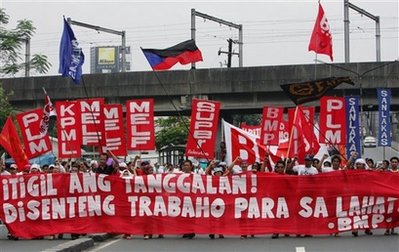Duterte: Fire Trade Secretary Ramon Lopez now
During the election campaign,
President Rodrigo Duterte won the hearts of many workers when he promised to
immediately end “contractualization,” or the practice of not giving workers the
wages and benefits they should receive under the law by hiring them as
“contractual” rather than regular workers.
Then, during his inaugural
speech, President Duterte said that his government will be guided in part by
former US President Franklin Delano Roosevelt’s statement that, “The test of
government is not whether we add more to the abundance of those who have much;
it is whether we provide for those who have little.”
Today, one person in the
President’s Cabinet has gone out of his way to prevent the President from
fulfilling his campaign promise and from passing the test that Roosevelt set.
Since he assumed office,
Department of Trade and Industry Secretary Ramon Lopez has consistently opposed
measures to end contractualization that we at the Bukluran ng Manggagawang
Pilipino, along with other labor groups in the country, have been demanding.
Recently, Lopez even championed
the so-called “win-win” but in fact win-lose solution that purportedly seeks a
middle-ground between capitalists and workers but in fact again ultimately
harms the interests of workers since it will continue to force them to live a
life of precarity and near-destitution while allowing the rich to earn more
profits and live a life of luxury on the back of contractual workers.
Yesterday, he again spoke out to
defend contractualization by saying that ending it would make the country less
attractive to foreign investors by removing their “flexibility”—as if
“flexibility” for investors has not come and will not come at the expense of
the well-being of Filipino workers.
At
every step of the way, then, Lopez and his department has represented not the
interests of Filipino workers but of capitalists—Filipino and foreign. He fails
the test that Roosevelt set because he wants to “add more to the abundance of
those who have much” rather than “provide for those who have little.”
In so
doing, he is challenging and defying President Duterte himself since the
President has said that he wants to “provide for those who have little” and he
has promised to end contractualization.
This, then, is an important
moment for the President—another early test forcing him to choose whose side he
will take and whose interests he will protect.
If
the President really cares about Filipino workers, if he really wants to to
“provide for those who have little,” then he should match his rhetoric with
action and do what needs to be done: he should immediately fire those in his
Cabinet who favor contractualization.
More than this, he should
immediately take steps needed to end labor flexibilization once and for all by:
1) certifying as urgent – and mobilizing all his party mates to pass – a bill
to amend Articles 106 to 109 of the Labor Code in order to prohibit the
contracting and subcontracting of “usually necessary or desirable” work in the
normal operations of a business, which should be performed by regular
employees, in line with Article 280 of said law; 2) revising the BMBE law so as
to remove the exemptions to labor standards compliance of small and micro
establishments, which comprise more than 90% of the employers’ sector; 3)
repealing DOLE’s DO 18-A and issuing a new order which reviews all existing
subcontracting arrangements and cancels those that encroach upon the duties and
functions, which should done by regular employees; 4) actually prosecuting
employers that practice contractualization, starting with the Sys, the Ayalas,
the Gokongweis and others.
Otherwise, if he allows the
pro-contractualization Lopez to stay in his Cabinet and if he does not carry
out all these steps immediately, it will become harder and harder for us not to
confirm what many of us have long suspected but wanted the President to refute:
That he did not really mean what
he said when he said he would end contractualization, that he does not really
care for all Filipinos but just for his fellow elites, and that he will not
really bring about real change—just like all his predecessors.




